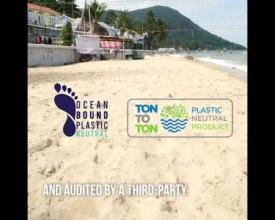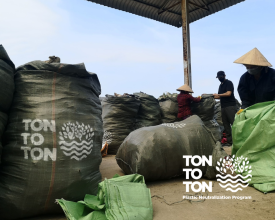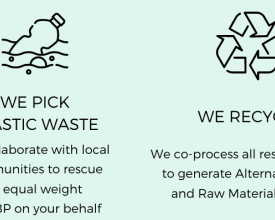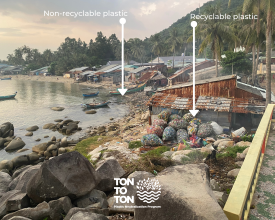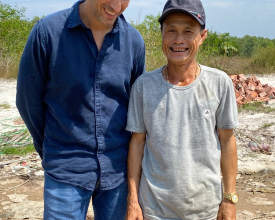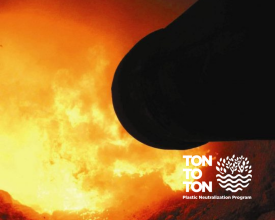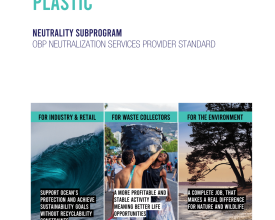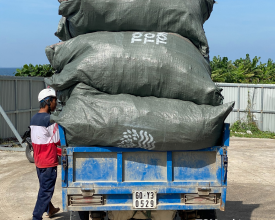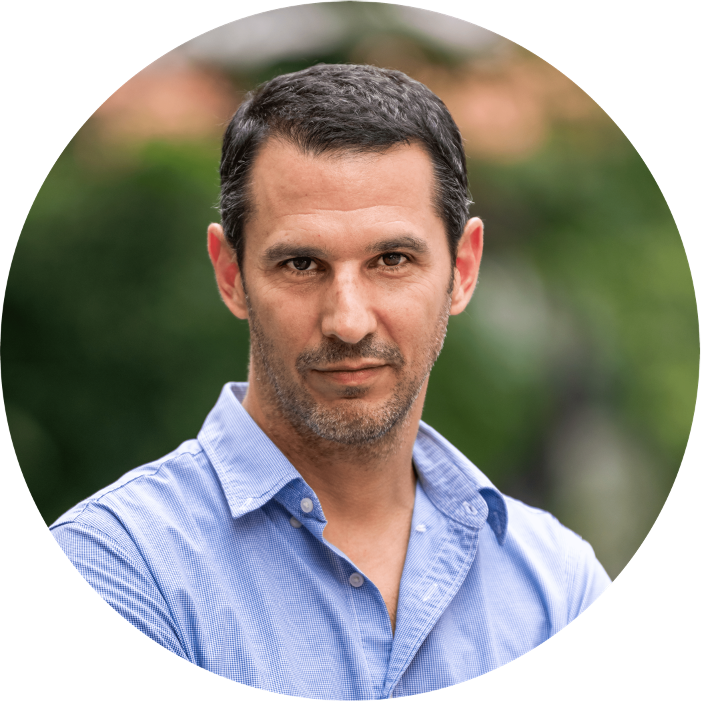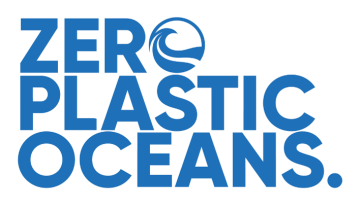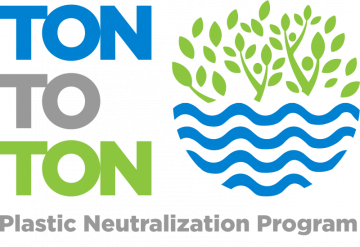
TONTOTON - Influencing Impact from the Ground Up
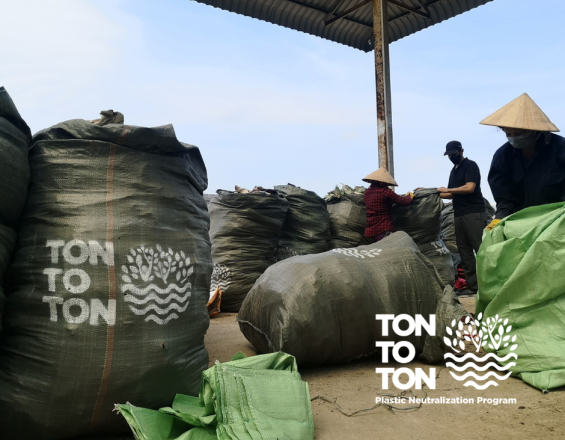
TONTOTON connects businesses to environmental impact via a certified plastic credit system. We prevent post consumer non-recyclable plastic we call orphan plastic, from reaching the oceans and create a new market for them.
Together with local communities, we identify the locations with immense environmental leakage. Local waste pickers are then employed to collect these orphan plastics, providing them new sources of income and better working conditions. Majority of our waste pickers are women.
Later, plastic waste collected are coverted into energy by co-processing. Everything is certified by the Ocean-Bound Neutrality standard and audited by a third-party control body. Businesses that support our projects are not only able to neutralize portion of the plastic in their products that they cannot immediately remove from their supply chain. More importantly, they support the social and environmental activities involved towards the creation of the plastic credits.
Context
Challenges addressed
Social Challenges
- Lack of income opportunities in economically-challenged communities
- Lack of job opportunities for women
Environmental Challenges
- Environmental leakage of non-recyclable, ocean-bound plastic in the environment
- Susceptibility of unmanaged waste to open burning, illegal dumping, and ending up in the waterways
- Poor waste management
- None or unimplemented recycling solution for non-recyclable, low-value plastic
Location
Process
Summary of the process
Responding to the growing demand of companies for a truly sustainable environmental solution, TONTOTON created a certified plastic neutralization program which triggers the interaction of different players from various layers of society, environment, and economy.
Any business with sustainability agenda in place can support this program, first by defining their goal translated by the quantity of plastic they want to neutralize. TONTOTON by collaborating with local waste pickers shall collect an equal amount of ocean-bound non-recyclable plastic from the certified project sites. Collected waste are then treated and undergo the co-processing method generating alternative fuels and raw materials (AFRM). This entire process is defined under the protocols of Ocean-Bound Plastic Neutrality that is audited by a third-party control body. Corporate supporters of these projects then become certified sustainable business joining the movement of Plastic-Free Nation.
Building Blocks
Collection of Ocean-Bound Plastic (OBP)
Single-use plastic is too light, and its value too low to be collected and recycled. It has no market value, making it "Orphan Plastic" that is more likely to become marine litter. Ocean-bound describes plastic’s last stage before it ends up in the ocean. It appears in rivers, shorelines, and even land. While most of the ocean-bound plastic (OBP) originates within 50km of the shore, OBP may come from a location more inland, but because of mismanagement, it’s now headed toward our ocean. The best way to guarantee that plastics stay out of the ocean is to stop the issue at its source. Unfortunately, single-use plastics are too convenient, which means that we’re still years away from eliminating non-recyclable plastics entirely.
While we wait for a viable substitute for non-recyclable plastics, we focus our efforts upon projects that seek to stop mismanaged OBP before it hits our ocean.
Enabling factors
- Collection site identification. TONTOTON team will select sites based on the OBP certification and proximity with the factory.
- Upgraded co-processing technology near the identified site. The cement factory partner should have the technology and management system required to treat the waste.
- Governmental approval & community support. All activities must be submitted to the people's committee and Ministry of Natural Resources and Environment (MONRE)
Lesson learned
Our learned lessons are mostly driven by the challenges we encountered and is continuously encountered at some point.
- Developing and maintaining Government cooperation in different areas. It is important that all activities are supported by local government. When objectives and activities are aligned, creating a sustainable local waste management system would be attainable.
- Developing sources following ocean-bound standard. Due to pandemic, mobility has been a challenge and developing new collection sites compliant to the ocean-bound standard could be tedious. It has to be done right all the time. Auditors and certifiers would ideally need to have a clear visual idea of the subject location.
- Developing logistics solution for moving wastes between collection and treatment sites. Collected waste due for co-processing must maintain the lowest moisture content. During rainy season, long travels to transport the wastes to cement factories would not be ideal. The development of collection site must be considered together with the proximity of cement factory that will do co-processing.
Resources
Collaboration with Local Communities
We work in poor waste-management areas with informal waste-pickers, who can benefit from better earnings. TONTOTON has created a new market for the orphan plastics incentivizing waste pickers for its collection of which formerly, they would otherwise ignore.
Under the program waste pickers are provided with:
-
equipment for safer working conditions: masks, shoes, gloves
-
access to the minimum health insurance
-
sustainable earnings to fight poverty
-
training for sorting, safety and more
Enabling factors
- Connection with local waste pickers groups
- Local government permission and support
- Local community awareness and willingness to take action
Lesson learned
When collaborating with local communities, it is imperative to first understand the local context -- their actual needs and challenges and then start planning your project from there.
While our cause is good, we are foreign to them and it is important to involve and educate them to the objectives and benefits of the project that is personal to them to get them on-board and later on would own the project and take accountability within their own surroundings.
Resources
Valorization of Orphan Plastic Collected
Co-processing is a safe, eco-friendly waste treatment, in line with the Basel Convention Technical Guidelines. It has been recognized as a recovery operation under EU legislation. This solution enables to avoid of open-air plastic burn and provides a greener solution for the cement industry.
It is a technology that converts manufacturing waste (like orphan plastic) into alternative fuels and raw materials (AFRM). Simply put, it’s when the trash is burned for its energy fuel rather than sources like petroleum and coal. The benefits of co-processing plastic are multiple: it reduces CO2 emissions by burning plastic rather than coal, it minimizes the use of non-renewable resources, it reduces plastic waste, and it’s a zero-waste practice since even the ashes are used in cement manufacturing. Cement factories offer the perfect solution to plastic management. Burning plastic for fuel rather than coal is a cleaner option, and it properly eliminates plastic that otherwise would have ended up in landfills, as ocean-bound plastic. The leftover ashes are mixed into the cement, ensuring that the entire process is zero-waste.
Utlimately, the world benefits because plastic waste is being eliminated and fewer non-renewable resources are being used.
Enabling factors
Upgraded Co-processing technology. The cement factory partner should have the technology and management system required to treat the waste.
Lesson learned
Recovery or waste-to-energy solutions are not popular solutions and receive great criticisms among environmentalists. Use of words is very critical in this industry, and it is important to emphasize that co-processing is far different from incineration. The process is done in a controlled environment, governed by globally-approved standards and monitored 24/7.
While we agree that the ultimate solution to plastic problem is to eliminate them from the source. But we also need to recognize that there is a nagging problem of plastic pollution, NOW. Co-processing is what we found best to treat large quantities of non-recyclable plastic wastes right now, and we would be happy to discover a better solution in the future.
Resources
Certified Solution
Our activities are audited by a 3rd Party Control Body as part of the Ocean Bound Plastic Neutrality Standard. Credibility is key. Corporations participating in the TONTOTON plastic neutralizing program receive certificates to verify the quantity of waste collected, transported, received, and converted into AFRM, allowing quantifiable and reliable reporting to all stakeholders of your business. Neutralization Certificates are kept in a Public Registry to ensure no double counting.
Enabling factors
- Globally-recognized protocol on ocean-bound neutrality. This governs the definition of ocean-bound plastic and all activities surrounding the production of the plastic credits.
- Third-party auditor/control body. They are the checks and balance that ensures all procedures in the production of plastic credits are compliant to the protocol. Only then the certified credits are recorded to the public registry to avoid double selling.
Lesson learned
In this industry, there is always tendency of greenwashing as corporations are cramming to be labeled “eco-friendly” or “sustainable” in order to remain relevant and competitive among consumers with growing demands for sustainability, not to mention to comply and respond to the global pressure on sustainability.
Thus, TONTOTON deems that an independent certificate audited by a globally-acclaimed third-party control body is a must to establish accountability. This helps us to be always on our toes in terms of ensuring all our activities are proper and aligned with the protocol.
TONTOTON also urges our business clients to sign a sustainability commitment, with the understanding that plastic credit is only a part of its overall action plan towards reducing or removing plastic in their bsupply chain.
Plastic Credit
Plastic credit allows a company to neutralize its plastic production and concurrently connects its brands and products with the social and environmental impact embedded within the process of producing the credits. Plastic credits are based on the weight of the plastic that a company produces. The money spent on the plastic credits will then go toward environmental projects that will eliminate an equal amount of orphan plastics as a company produces. If a company purchases plastic credits equal to the amount of plastic that they produce, then they are considered plastic neutral. Ideally, we would be working toward eliminating orphan plastics entirely, while plastic credits only serve to assist in managing the disposal of orphan plastics. However, they are a positive short-term remedy while we, as a world community, determine a more sustainable solution.
Enabling factors
Corporate collaborators. Their support enables TONTOTON to develop and implement more projects continuing the chain of positive environmental and social impact.
Plastic Credit Framework. It is imperative to define to which framework the company will operate upon the production of plastic credits. TONTOTON chose to remove ocean-bound orphan plastic waste from the environment as we see the highest environmental and social impact in it.
Lesson learned
It is important to work with companies who take sustainability seriously and not just jumping into the bandwagon of this conversation. Not because they can neutralize the plastic elements in their supply chain that they cannot immediately remove, they have the excuse to just produce more without any plastic recycling or reduction plan in place. These solutions must go hand-in-hand in order to achieve the best impact that our planet deserves.
Resources
Impacts
Environmental:
- Reduction of orphan plastic in the environment
- Reduced plastic intake into the ocean and soil
- Prevention of air pollution with open burning
- Reduced use of coal due to co-processing/Valorization of non-recyclable waste into energy
- Reduction of CO2 emissions
- Conservation of natural resources
Social:
- Empowering informal waste-pickers with fair wages and additional income
- Allowing waste-pickers to access basic healthcare and safer working conditions
- Enabling gender equality at work
- Raise awareness on plastic issue on community level
Economic:
- Certified contribution to the reduction of orphan plastic
- Economic viability for stakeholders – waste-pickers, cement factories, and business sustainability of clients
Beneficiaries
- Local waste pickers getting new income sources
- Collaborating companies improving their sustainability
- The environment/ocean due to less plastic
Sustainable Development Goals
Story
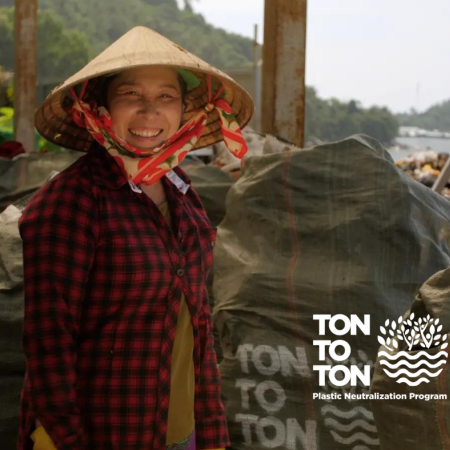
Above anything, TONTOTON’s projects are able to employ women among economically-challenged communities. Our ground stories keep us going and here are two of our most inspiring ground colleagues.
Mrs. Lanh lived in Giong Rieng District, 200km from Hon Son Island. She arrived 3 years ago and started working part-time as a cleaner for hotels and part-time in a sorting facility. As a result, she only visits her family a few days in the year.
She now works with TONTOTON. During our last meet-up she shared, "I can get more money to pay for my family expenses".
Mrs. Cuc's family and her 3 kids currently live in Quang Binh Province, 1500km from Hon Son Island. She arrived 2 years ago and followed the same path as Mrs. Lanh, as a cleaner and worker in the sorting facility. Since last November Mrs. Cuc collaborates with TONTOTON and expressed wanting to pursue this work until she retires.
Creating a new market for the low-value plastics extracted our waste-pickers from the ground battle for value plastics. As there’s a huge market for those kinds, waste-pickers are literally fighting for them. TONTOTON’s project opens a new opportunity, and low-value plastics are hugely present more than we can collect.

